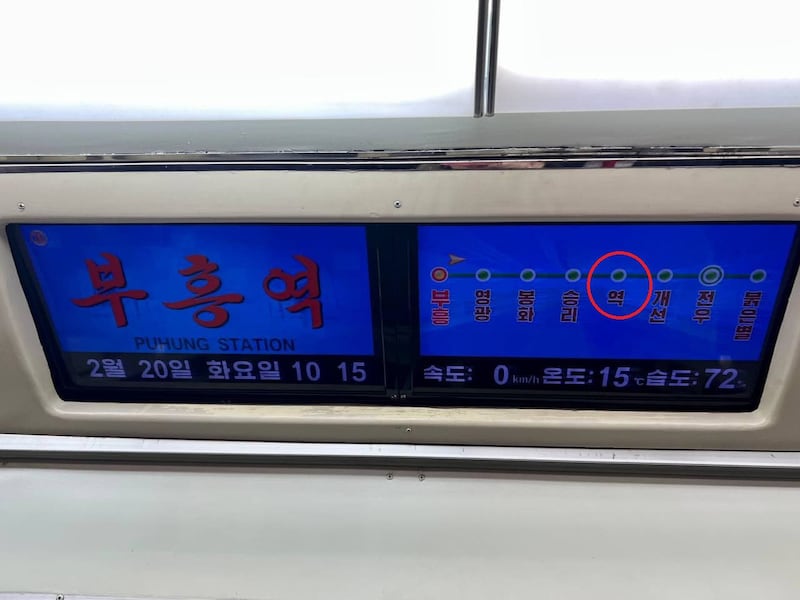UPDATED on Feb. 21, 2024 at 4:22 p.m. ET
North Korea has banned more than 100 patriotic songs because they refer to reunification with the South – the latest step making it clear that unifying the divided peninsula is no longer a priority for Pyongyang, generating confusion among residents.
"The place our general pointed to was oh, a unified country, and a race made as one!" go the lyrics of the popular song, " Where Our General Pointed," which talks about the pain of a divided country and a longing to join the tallest mountains in North and South together.
It is among dozens of songs composed since the end of the Korean War more than 70 years ago that contain the word unification, or tongil, in Korean.
But since the start of the year, supreme leader Kim Jong Un has ordered the government to take several steps to distance the North from the South.
They include removing language from state media indicating that Koreans on both sides of the DMZ are " one people," ending all economic cooperation with the South, and even tearing down a major Pyongyang landmark symbolizing a future reunion. Kim has also publicly threatened to " annihilate" Seoul.
This has even extended to metro station names. This week, Unification, or Tongil, Station on the Pyongyang subway's Chollima Line has been renamed just “Station,” photos posted on Facebook by the Russian Embassy revealed.

And now, suddenly all songs that contain the word “unification” or make references to places in the South are prohibited.
Confused populace
The leadership wants to make it clear that reunification with the South and its people is no longer a priority, but the people are confused by the sudden shift, a resident in the northwestern province of North Pyongan told RFA Korean on condition of anonymity for security reasons.
During the reigns of Kim Jong Un’s father and grandfather, unification was always emphasized as the major goal for the country, he said. “This is not just a reversal of the lifelong instructions of previous leaders, but also a denial of the identity of the Korean people,” the person said.
Banning “Where Our General Pointed” is particularly shocking because it was a song closely tied to thoughts expressed by Kim Jong Un’s late father Kim Jong Il, he said.
“[The authorities] keep bragging about having nuclear power, but they lack confidence in everything else. That’s why there are so many things that they’ve banned,” the resident said.
“How can the Korean people, who have lived in one territory and one region for five millenia, now have nothing to do with each other just because they banned unification songs?”
Though the starting point of Korean history is not clearly defined by consensus, legends suggest that the kingdom of Gojoseon was founded 4,357 years ago by the mythical figure Dangun. Even so, Korea is often colloquially said to have a history spanning 5,000 years.
Other banned songs include “Nice to Meet You,” “Until We Meet Again,” and “Our Wish is Unification,” a resident in the northeastern province of North Hamgyong told RFA on condition of anonymity to speak freely.
The latter song is also taught to children in South Korea and has been used as an unofficial anthem during inter-Korean cultural exchange and sporting events.
“When residents get a chance to sing in their daily lives, they sing a lot of these unification songs,” the second resident said. “But the authorities have ordered us not to sing even ‘Where Our General Pointed’ from now on, so the residents are saying that the [previous leaders’] lifelong wishes of unification have come to an end under Kim Jong Un.”
Other changes
Another reason for the ban is that the people are increasingly in awe of the economically vibrant South at a time when North Korea’s economic situation is worsening, she said.
The banning of the songs is seen, however, as orders from the authorities to “accept the separation of Korea and division of the Korean race,” she said.
Last month, the North’s state-run broadcaster aired a map that highlights only the northern part of the Korean Peninsula in red, a move seen as its push to drop references to unification.
Additionally, the authoritarian state has dropped a phrase symbolizing a unified Korea from the lyrics of its national anthem, while erasing an image of the Korean Peninsula, viewed as a unification reference, from its major websites, according to media reports.
They include Foreign Trade of the DPRK, a website created to promote North Korea's trade and attract investments, and Publications of the DPRK, a foreign language publishing house. DPRK, or the Democratic People’s Republic of Korea, is North Korea’s official name.
South Korea’s Unification Ministry has voiced regret over the North’s move, lamenting it as an “anti-national” act.
Translated by Claire S. Lee and Eugene Whong. Written in English by Eugene Whong and Taejun Kang. Edited by Malcolm Foster, Elaine Chan and Mike Firn.
Updates story to add description of banned patriotic songs and other details.
